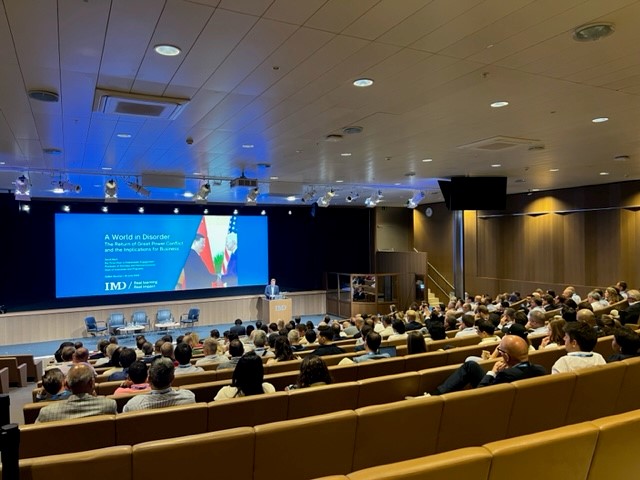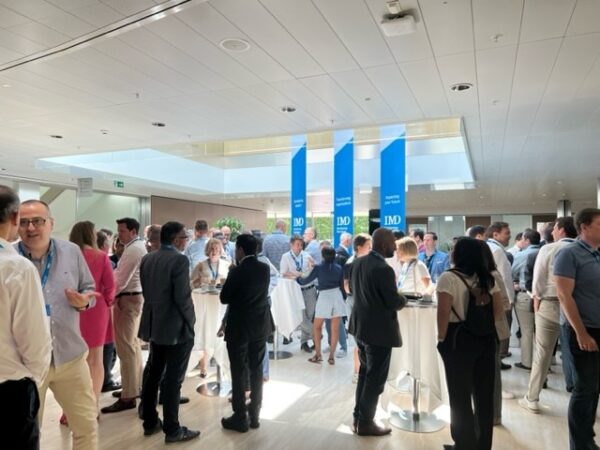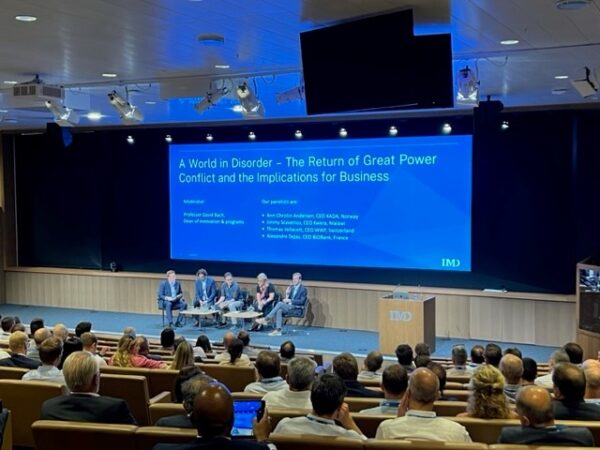
Alumni from eight EMBA classes gathered in Lausanne to reconnect with peers and explore how businesses can navigate in a world that is a lot more complex and conflictual than just a few years ago.
From the war in Ukraine and deteriorating relations between the United States and China to inflation, rising populism, climate change, and artificial intelligence, business leaders are facing new sources of turbulence, said Professor David Bach, Rio Tinto Chair in Stakeholder Engagement and Dean of Innovations and Programs, during the event’s main presentation.

While alumni gathered in Lausanne cited the war in Ukraine and inflation as the biggest short-term drivers of turbulence, the climate crisis and AI were seen as the most pressing topics that business leaders need to solve over the long term.
A failure to address these challenges could lead to a further deterioration in democratic freedoms, said Bach, where growing economic anxiety is fueling populism and reshaping politics. Over the past 17 years, the number of countries that have become more democratic is less than those that have become less democratic, according to Freedom House.
“We are very much in a world in which democracy is under siege – both internally and externally – and in a world of greater scrutiny, that puts many businesses with values consistent with democratic forms of government into a bind,” said Bach. “If we cannot create jobs, save the planet, and deal with AI as democracies, it’s going to be very, very difficult for people to continue to stand up for democratic rights and freedoms.”
Four scenarios for the future
Faced with these multiple sources of turbulence and uncertainty, many companies are engaging in scenario planning, which involves thinking through how different configurations of those factors might lead to very different worlds. Bach shared four scenarios for the future based on past historical decades to help illustrate what the stakes could be.
Scenario 1 – 1920s: A period of economic recovery where inflation comes down and global tensions ease could see the world enter a period that resembles the roaring 1920s.
Scenario 2 – 1980s: If the economy recovers, but global tensions ratchet up further we could find ourselves in a period not dissimilar to the 1980s.
Scenario 3 – 1970s: If the economy continues its downward spiral with rising unemployment and stubbornly high inflation, while global tensions ease, the future could look like the 1970s.
Scenario 4 – 1930s: The worst-case scenario would see a deteriorating economy and rising global tensions which could give rise to a period like the 1930s, the darkest chapter in the 20th Century.
“From where we stand today, the future is as uncertain as the range of differences across these scenarios,” said Bach.
Short-term setbacks
Against this backdrop, a panel made up of EMBA graduates discussed how these sources of turbulence were impacting their work.
Jimmy Scavenius, Founder and CEO of nonprofit social enterprise Kwera, noted how Russia’s invasion of Ukraine saw money diverted away from African countries.
“From where we stand today, the future is as uncertain as the range of differences across these scenarios”
-David Bach, Professor of Strategy and Political Economy, Rio Tinto Chair in Stakeholder Engagement and Dean of Innovation and Programs at IMD.
Echoing the negative implications for the short term, Ann Christen Andersen, a long-time oil and gas executive and Founder and CEO of 4ADA AS, noted how oil and gas had gone from “zero to hero.”
Despite these short-term challenges, Andersen stressed the importance for executives to plan for the long-term, for example by working to adapt their businesses to climate change and limit the risks posed by AI.
“If we let AI loose, populism is going to be on steroids,” she said. “Chat GPT might bring a lot of productivity to all our businesses, but it’s certainly going to bring a lot of negative stuff too.”
‘Bring on the turbulence’
Panelists were confident, however, that over time, increasing volatility and turbulence could help turbocharge some of the investments and decisions needed to move to a more sustainable and inclusive world.
Thomas Vellacott, CEO of WWF Switzerland, pointed to two recent landmark international agreements – the Kumming-Montreal Global Biodiversity Framework and the UN High Seas Treaty – as indications that international cooperation on the environment is still possible, even in times of conflict and turbulence.
“I can understand that we are worried about turbulence, but when it comes to sustainability, what worries me way more than turbulence is not enough turbulence. It’s business as usual because that will lead us to the biggest problem that we can possibly have – living on an uninhabitable planet,” he said. “Bring on the turbulence; we need more of it. We need faster change than we have today.”
Concluding the session, panelists were asked to give examples of how the world’s increasing disorder has impacted how they run their businesses.

Alexandre Tepas, CEO of healthcare company BIOBank, said if executives wanted to “walk the talk” on sustainability it was important to consider different criteria, beyond just profit when making investments, while Andersen said she was putting more of her energy and investment into the renewable energy space.
Scavenius called for a greater focus on the “S” or social aspect of ESG and said business leaders should reframe “risk and return” as “risk, return, impact.”
Echoing the need for action, Vellacott urged organizations to think about whether their business model would still be viable in a net-zero world and work backward from 2050 to figure out the steps they need to take to be fit for the future.
“Think about shaping this turbulence and transformation,” he said. “Do not see yourself as victims of these geopolitical forces.”


